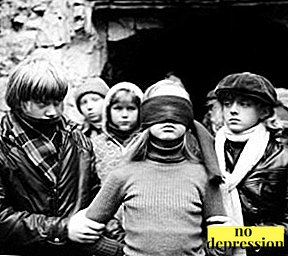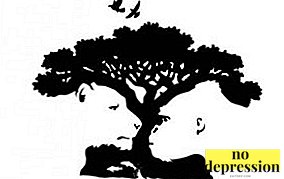Victim complex - It is a stable line of behavior that unknowingly provokes others to mistreatment.
Such a course of behavior is in most cases peculiar to women and originates in children's impressions.
State description

What is a victim in psychology? The science of the psychology of the victim is called victimology.
Discipline is aimed at studying becoming a victim of crimein particular, on the study of real victims as carriers of the ability to become a victim.
The state of the victim in psychology is human positionin which he blames others for his failures and troubles, looking for those guilty of their troubles. Sometimes the victim specifically takes on the responsibility to unwittingly become a victim of circumstances.
Causes and Effects
The victim perceives the surrounding reality as alien, aggressive worldwanting to hurt him.
This line of behavior is most often born of the negative events of childhood, the memories of which haunt a person throughout their lives.
The reasons for this behavior may be several:
- Self-doubt, low self-esteem - as a rule, insecurity is born in childhood or adolescence due to lack of parental love and care or bullying of older people, peers.
- Dependence on the opinions of others - such a person tries to please everyone and everyone, adapting to the judgments of the people around him.
 Fear of singling out from the crowd, to be different from others - this fear also comes from childhood, when the child tried to be as inconspicuous as possible because of the fear of being mocked.
Fear of singling out from the crowd, to be different from others - this fear also comes from childhood, when the child tried to be as inconspicuous as possible because of the fear of being mocked.- Fear of failure, fear of being rejected.
Due to these reasons, a person tries to find the cause of his troubles and sufferings outside his personality, he is looking for the guilty.
Unsure of his strength, he unknowingly tries cause self-pityas if to say of life and others “hit me”, “humiliate me”, “hurt me”.
Such a person acts only as he is told, being confident in the strength and mind of the people around him. He considers himself to be flawed and incapable of making the right decisions.
About the causes and consequences of the victim syndrome in this video:
Types and types
The victims according to their characteristic features are divided into the following types:
- infantils - such people are spoiled by the caress and care of their parents and are confident in their irresistible. They are not at all prepared for the real life and cruelty of some people;
- risky, bright personality - such people are looking for adrenaline and are ready for anything to achieve their goal. Cruelty and violence are perceived by such people as a game, an opportunity to get a thrill;
- "White and fluffy" - outwardly positive people, endowed with their own, are looking for dependencies to another person - economic, physical, emotional. Such people are themselves looking for a "master" who could manage them;
- successful and independent peopleaccustomed to fight and go to the end. They are ready to sacrifice even for the sake of achieving a ghostly goal and will stop at nothing. As a rule, such people do not know the measures in any area of life.
Potential victim

A potential victim is a person with properties and behavioral traits that increase the risk of committing a crime or violent action compared to other people.
Such a person as if provokes the criminal to commit the act in his direction.
The psychology of the victim is manifested not only in real crimes, but also in everyday life. Often in family relationships such a situation develops. where the husband becomes a tyrant and the wife becomes a victim. This can occur for several reasons:
- the husband earns money and provides for the family, placing the woman in a position dependent on him. He works and gets tired, so he has the right to everything;
- the insecurity of a woman makes her justify everything that her husband says or does;
- the fear of taking responsibility for one’s life — the woman herself gives the man the reins of his life, resignedly to him, submitting and taking all the mockery and insults for granted.
Such a man in the family terrorizes not only his wife, but also all other family members. A man considers himself the master of life and considers it necessary to control his family.
Another common situation is where the mother plays the role of a tyrant, and the role of the victim remains to the daughter. Such a mother believes that the world outside the house is vicious and cruel, it projects its complexes and fears on the child.
The girl grows up with a sense of guilt and shame, not allowing herself to retreat from the rules inspired by her mother. Sometimes mom-tyrant thinks out a disease for herself in order to bind her daughter to herself.
What is a victim? About the types of victims in this video:
What is the benefit?
Complex sacrifice in a woman - why is it profitable to be a victim? A female victim often pities herself looking for the culprit of their sometimes invented problems. She often cries, complains about life, tries to shift responsibility for her decisions onto other shoulders.
But for a woman, such a position often seems to be advantageous - she receives attention, support, and help from other people.

Sometimes with such a helpless look she hopes to attract a strong man.
Much is allowed and forgiven to the woman victim, because she, poor-unhappy, has suffered from the evil world.
The role of the victim removes many of the obligations of the woman, and the victim herself becomes easier to achieve the desired.
How to get rid of the complex?
To get out of the victim's syndrome, need to follow a few rules in life:
- Do not imagine what really does not exist.
- Do not be offended and do not blame people for their problems.
- Focus on what is, and not on what is not or is not enough in life.
- Understand that no one owes anything to anyone.
- Do not be afraid to take responsibility, try to cope with all the difficulties on their own.
- Do not be afraid to defend their interests, to fight for what you really want.
How dangerous is the victim complex and how to get rid of it? Tips in this video:
Karpman Bern Triangle - how to get out?
According to the theory of C. Bern in the triangle of interpersonal relations, each participant plays a role - The victims, Aggressor (Chaser) and Savior (Deliverer).

A person can try on different roles in this triangle, but the main thing does not change - each participant is satisfied with the current situation: the Aggressor is happy with his role as the master of destinies, the Sacrifice likes to suffer and receive general attention, and the Sufferer likes to feel like a “good” person and receive appreciation from the Sacrifice.
To get out of the role of the Sacrifice, you need realize your position and try not to repeat your past actions.
The victim must take responsibility for their feelings and actions, do not ask for help from outsiders, and try to get out of this situation.
It often becomes difficult for the Victim to realize what she really feels and wants to receive, to feel.
What is Karpman's Triangle of Fate? Learn from the video:
What is victimization?
Victim is called addiction, a certain predisposition of a certain person. becomes a victim of a crime, an act of violence.
Some experts argue that this propensity is directly dependent on the state of crime. Such potential victims of crime in psychology are called victimized individuals.
In contrast to victim complex victimization is considered rather social, social conceptthan personal. Victim personalities behave in a similar way due to the line of conduct imposed by society.
Victim behavior

Victim behavior - This is the tendency of a person to fall into situations that threaten his life and health.
By his behavior, the person seems to be provoking an attack, although he deliberately does not want trouble.
For example, a male abuser will choose exactly that girl which behaves uncertainly. Such a girl silently freezes from fear and will resist helplessly, crying silently.
Also, on the contrary, too provocative behavior towards an aggressive person can be an example of victimization behavior.
Criminal can provoke a close, challenging look in the eyes, too cheeky behavior. The offender is like an animal, so this line of conduct can be perceived by them as a desire for action.
Victim behavior as a danger of becoming a victim is a line of conduct that directly provokes a criminal to commit a violent act.
This may be inadequate, too noisy behavior of a person, his intentional addiction damage property or insult people and so on.
Teenagers
Juvenile exposure it manifests itself quite differently than in adults - adolescents can become victims of violence not only because of their personal characteristics, but also because of the general victimization of the social group in which they are located.
Victimization of adolescents affects:
 negative and aggression from the people around them, asocial behavior of parents and teachers;
negative and aggression from the people around them, asocial behavior of parents and teachers;- neutral emotions and poise; calm;
- oversight or neglect of a teenager;
- psychological features of the child;
- sexual ignorance;
- emotional discomfort, “going into oneself”;
- uncertainty, isolation, fearfulness.
Victim personalities often become children from dysfunctional familiesexposed to violence and attacks from others since childhood.
Also, victimization can be caused by the desire of a person to stand out, to become popular among his peers.
What factors influence?
Factors affecting victimization behavior:
- ideological features of the state or a particular locality;
- historical era;
- social or professional community;
- individual human qualities, psychological characteristics;
- the prevalence of crime in the region.
There are also some qualities that negatively or positively affect victimization behavior.
TO reduce victimization qualitiesincludes confidence, emotional and psychological maturity, composure. TO qualities that increase victimization, include caution, isolation and helplessness.
What is victimization? On the meaning of the word - victimization:
Tyrannical relationship
Such relationships are built on the implementation of the “tyrant-victim” model, where everything is aimed at fulfilling the wishes of the tyrant. He thinks he is perfect, and the victim accepts these rules of the game.

Such relationships are characterized by violence of any kind, both physical and emotional.
As a rule, there are reception "swing" - abuse and fights are combined with periods of calm and prosperity, tenderness alternates with rudeness and humiliation.
How to stop being a victim in a relationship?
Victimization Prevention
TO preventive measures of victimization behavior concerns:
- Formation of a respectful attitude towards one’s own personality, acceptance of oneself and one’s own characteristics
- Getting rid of complexes and psychological blocks, getting rid of past offenses.
- Formation of a positive attitude towards life and people around.
- Analysis of their desires, preferences, life goals.
- The search for balance in communication with other people.
The main thing in the prevention of victimization behavior is the awareness of the same value of their own personality and the personalities of the people around them.
Useful literature
The most relevant today books on victimology are:
 MF Iriguyan "Moral harassment";
MF Iriguyan "Moral harassment";- Malkin-Puff “Victimology. Psychology of victim's behavior ”;
- V.E. Khristenko "The Psychology of Victim";
- V. Tulyakov "Victimology";
- A. I. Papkin "Modern criminal victimology".
In the 70s the concept of "victimization behavior" subjected to criticism from the movement of feminists.
They called such an approach the accusation of the victim of the crime committed and the removal of half the guilt from the criminal himself. Therefore, at present, a similar term as an assumption, not a complete theory forensics and psychology.
Mental victimization - guilt or trouble? About prevention in this video:

 Fear of singling out from the crowd, to be different from others - this fear also comes from childhood, when the child tried to be as inconspicuous as possible because of the fear of being mocked.
Fear of singling out from the crowd, to be different from others - this fear also comes from childhood, when the child tried to be as inconspicuous as possible because of the fear of being mocked. negative and aggression from the people around them, asocial behavior of parents and teachers;
negative and aggression from the people around them, asocial behavior of parents and teachers; MF Iriguyan "Moral harassment";
MF Iriguyan "Moral harassment";

